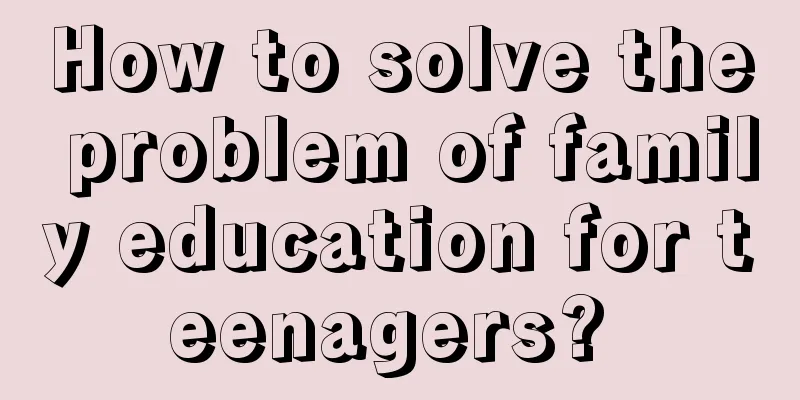How to solve the problem of family education for teenagers?

|
When children reach adolescence, they are most likely to become rebellious. Children of this age will have many problems. For example, they like to surf the Internet, often like to go out to play with friends, and easily develop a dislike for learning. In serious cases, they will go out to fight, etc. These bad habits are very troublesome for parents. So how should parents solve these problems that are prone to occur in teenagers? How to solve the family education problems of teenagers? School education, social education and family education are all very important for a student. But the most important of the three aspects of education is family education. As Suhomlinsky believed: "Some tragedies often occur in families where parents are not aware of their responsibilities." In today's society, the proportion of middle school students who are tired of studying is about 20% in developed areas and about 40% in underdeveloped areas. Society has a responsibility, schools have a responsibility, but family education has a greater responsibility. This is particularly evident in some individual middle school students. For example, some parents neglect or despise their children's education because of their divorce; some parents have low cultural level and either let their children take their own course, or spoil them, or are overly strict with them, or the parents' ability to teach by example is poor or bad; this kind of family education will bring about immeasurable impacts and consequences. So in a sense, there are no unqualified children, only unqualified parents. Family education not only affects children's growth, but also affects families, schools and even society. Therefore, family education is no longer a private matter of each family, but a great cause that both a nation and a country should attach great importance to. First of all, the family education of middle school students should adhere to the following principles: I. Principles of Equality and Respect Respecting children should be a primary principle of middle school student family education. The word "parent" literally means the leader of the family. What's more, parents and children are different in age, in who receives education earlier or later, in terms of social experience, in terms of economic strength, etc. In terms of family roles, parents and children are actually unequal. But precisely because of this, in parent-child interactions, we must pay more attention to respecting children and respecting their personality from an early age. Because, in terms of personality, parents are equal to their children. The principle of equal respect is not just a technique for children to listen to their parents, but is based on a true belief in the recognition and protection of human dignity. Only in this way can parents naturally show respect for their children in parent-child interactions and have their children feel it. The educational power of such expression and feeling is enormous, which is not only reflected in the immediate educational results, but also in the process of the formation of the child's healthy personality. However, that kind of "respect" for the sake of respect, and the expedient "respect" to make children obedient, is not only often tiring, unnatural and difficult for parents to implement, but it is also easily seen through by middle school students. What is more regrettable is that they learn one word from their own relatives: hypocrisy. This will discourage many children and will be extremely detrimental to the formation of their character. Equal respect for people is a belief. The true equality and respect for children that comes from this belief is itself a kind of education. Respecting children's thoughts, wishes and emotions, allowing children to handle some things themselves, helping children make decisions through joint discussions, giving children the right to express themselves normally and retain different opinions, not hurting children's personality when criticizing, etc., are all things that need to be paid attention to when implementing this educational principle. 2. The principle of child orientation It means that in the education of children, from determining the children's development goals to talking to the children and making demands, all things should start from the children themselves. Various studies have shown that when a person's behavior is based on his or her inner needs, the motivation in the action is the highest and does not rely on external rewards. Parents are obviously aware of this, or have a deep understanding of it. An example is: when many parents are admonishing their children earnestly, they often add a sentence: "This is for." This is to try to make the children understand that parents are not advising themselves but the children. In a sense, children are indeed the continuation of their family and their own development. However, this continuation does not mean that the children have to fill the shortcomings in the parents' personal lives, nor is it to save face for the parents themselves, but to start from the children's reality and promote their own healthy development based on the children's own positioning. When you help your child become an independent and autonomous person with his or her own pursuits, your obligations and hard work for the child will be realized. The true greatness of a parent lies in the fact that he pursues things for his children, rather than asking his children to pursue things for him. Using children as tools to realize one's unfulfilled wishes and meet one's personal needs is actually to limit children to the scope of one's own life. This is a narrow-minded selfishness and has nothing to do with the development of the family. The child is another person, not the parents themselves. In family education, if the focus is truly on children, parents will naturally set goals and make demands based on their children's actual conditions. They will naturally care about their children's emotional lives, allow them to vent negative emotions normally while guiding them to learn self-control, and naturally feel gratified for any progress made by their children that is in line with their own reality. They will naturally develop a peaceful heart. In particular, family education oriented towards children is a selfless education that respects the wishes of others. Children who receive this kind of education will respect their parents more while working hard to pursue their own goals. To sum it up in one sentence, we should create an education suitable for our children in the family, rather than trying to educate children that are suitable for ourselves. 3. Principle of Positive Expectation The facts tell us that what children feel their parents expect of them, that is, what kind of people their parents think they are and what kind of people they may become, will directly affect the children's own expectations of themselves, and thus affect the direction of their efforts and behavioral performance. Parents sometimes make a mistake: out of good wishes for their children's future, they show worry, anxiety and doubt about their children's current situation and future, and what the children feel is the latter. This is a negative expectation of children, and it is very likely that the children will involuntarily follow such expectations. "You are so stupid", "You are so lazy", "What will happen if you continue like this", "Did you make any mistakes in school today"... If parents often say these things to their children, it is equivalent to issuing a negative command to their children. Therefore, it is very important to let children feel positive expectations of them. To put it simply, it is to make the child feel that you hope he is good, think he is good, and believe he will get better. Please believe in your children and let them feel that they are great, they can do it, and they will be better tomorrow. Please appreciate your child, evaluate his or her behavior and results from a positive perspective, and express your admiration and joy for his or her strengths. In this way, children will feel confident and hopeful, and feel that their parents are kind, lovely and trustworthy, and they will spontaneously walk the path of healthy development with their parents. In fact, every child has many qualities that are worth believing in and appreciating. The problem is that parents do not look for and discover them. If parents always feel that their children are good for nothing, it may be that their expectations of their children are too one-sided; another possibility is that they themselves have flaws, that is, they are always looking for the shortcomings of others and cannot see the strengths of others, not just their own children. 4. Principle of overall coordination Family education is a holistic education. Various elements of the family have a holistic and unified influence on all aspects of the child. This requires implementing family education based on the principle of overall coordination. On the one hand, we should try our best to coordinate the overall educational influence of the family. This cannot be simply understood as either praising or criticizing the children. In fact, in this regard, absolute consistency is sometimes not required, but it is quite dialectical and artistic. The most important thing is the parents' attitude towards life, life concept, and the coordination of their requirements and control over themselves and their requirements for their children. If parents sigh and complain about their own setbacks in life, but ask their children to be strong in the face of setbacks such as in their academic studies, this is a very uncoordinated and contradictory education; if parents lose their temper, scold their children for not being able to talk to them calmly, and keep arguing and confronting them, this is also a very uncoordinated and contradictory education. Another thing is the overall coordination of all aspects of the child's requirements and expectations. The kind of parents who ask children to help others in some places but are afraid that their children will suffer losses and hope that their children will benefit in other places will make children feel confused, conflicted and at a loss. This can be extrapolated to other cases. On the other hand, we need to make a holistic analysis of children’s problems and provide holistic education, rather than treating the symptoms without addressing the root cause. Parents should learn to analyze their children's individual specific behaviors in the context of their overall behaviors, and in the context of internal psychological influences and external environmental effects. At this time, you may find that sometimes a child’s specific behavior is not what you imagined, and sometimes a child’s learning problems require work beyond studying, and so on. Man is a whole person, a person who is unified with his environment. It is important to implement education based on family influence and the child as a whole, rather than focusing on the gains and losses of the child's individual behavior. |
<<: The effects and functions of wearing Hetian jade
>>: The functions and effects of camphor seeds
Recommend
What are the symptoms of vitamin D toxicity?
Many people have not heard of vitamin D poisoning...
How to remove the odor of new shoes
Many people find that the shoes they buy have a s...
What are the cleaning methods for washing machines with odor?
Most households have washing machines, and many o...
The correct way to wash your face with honey and salt
Eating honey can treat constipation, cleanse the ...
What to do with stage 4 breast cancer
Stage IV breast cancer refers to breast cancer wi...
What are the correct steps for washing your face
We need to wash our faces every day, but many peo...
How long is the life expectancy of early nasopharyngeal cancer? How to check?
Some people worry that once they have cancer, the...
Foot deformity and valgus
We often see many mothers bringing their children...
What ointment should I use for an itchy butthole
Many people in life have suffered from the sympto...
What are the nursing assessment methods for kidney cancer
Many people will experience symptoms of kidney ca...
Diffuse liver cancer
Diffuse liver cancer Liver cancer is a very serio...
What are the benefits of male fluids for women?
When a couple has sex, if no contraceptive measur...
Do three-year-old babies need calcium supplements?
A three-year-old baby is in a stage of rapid deve...
Adult height increase method
Everyone knows that people can only fully develop...
What are the symptoms of vascular sclerosis and how to prevent it
The improvement in the quality of life has been a...









